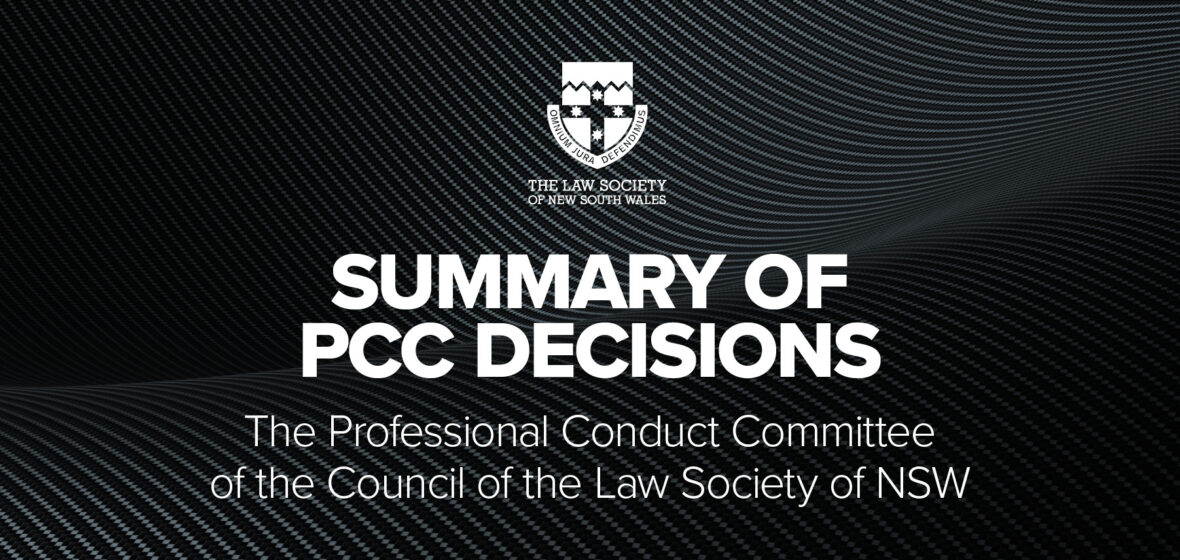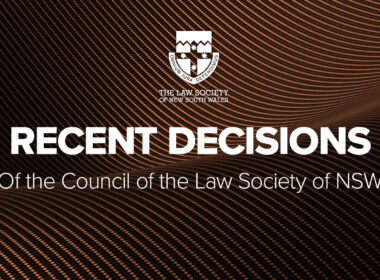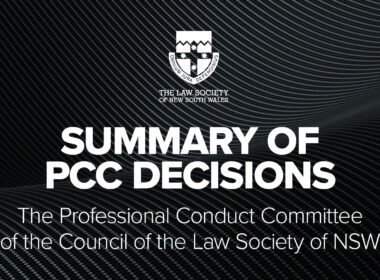The Professional Conduct Committee (PCC) of the Council of the Law Society of NSW (Council), under delegation from the NSW Legal Services Commissioner and the Council, deals with complaints referred to the Council by the NSW Legal Services Commissioner.
The Professional Conduct Committee (PCC) of the Council of the Law Society of NSW (Council), under delegation from the NSW Legal Services Commissioner and the Council, deals with complaints referred to the Council by the NSW Legal Services Commissioner.
A total of 113 matters were finalised during the April to June 2025 quarter (this quarter). These included 2 disciplinary matters , which involved the following conduct issues:
- Breach of an undertaking; and
- Conduct which falls below the standard of a reasonably competent lawyer.
Breach of an undertaking
The PCC considered a breach of an undertaking in somewhat unusual circumstances this quarter. The complaint involved an alleged breach of a term of an employment contract, which required the solicitor not to approach clients of the employer law practice, once the solicitor had ceased employment at the practice. The solicitor allegedly approached clients of his former employer in contravention of the restraint of trade clause.
Upon finding out that this had occurred, the solicitor’s former employer wrote to them demanding payment of a sum of money and an undertaking that the solicitor would not engage in further attempts to act for clients of the practice. Ultimately, the solicitor provided an undertaking that he would not “communicate with, canvass, solicit, approach or accept approaches from any existing or former clients of the law practice for a period of 12 months” from a specified date.
The solicitor, within 3 months of providing the undertaking to his former employer, acted for a former client of the practice.
Rule 6 of the Legal Profession Uniform Law Australian Conduct Rules 2015 (Conduct Rules) provides that “a solicitor who has given an undertaking in the course of legal practice must honour that undertaking and ensure the timely and effective performance of the undertaking, unless released by the recipient or by a court of competent jurisdiction.”
Further, Rule 5 of the Conduct Rules establishes the standard of conduct that a solicitor must adhere to. Relevantly, it provides that a solicitor must not engage in conduct in the course of legal practice or otherwise that demonstrates that they are not a fit and proper person to practise law.
The Western Australian Court of Appeal discussed undertakings in the matter of Legal Profession Complaints Committee v Detata [2021] WASC at [48]-[54]:
“
[48] The importance of legal practitioners performing their undertakings cannot be overstated…
[52] It is… vital that legal practitioners perform their undertakings, regardless of whether the undertaking was proffered in error or oversight, irrespective of any change of circumstances, no matter how radical and irrespective of any hardship to the legal practitioner concerned.
[54] For these reasons, the obligation of a legal practitioner to perform his or her undertaking is a solemn obligation of the utmost importance. Failure to perform that obligation will generally be regarded as professional misconduct, and depending on the circumstances, will often be regarded as serious professional misconduct.”
In view of the serious nature of a breach of an undertaking, the PCC had to consider whether the conduct of the solicitor was so serious that it amounted to professional misconduct. When considering this, the PCC took into account the impact of the breach of the undertaking on the court and the relative inexperience of the solicitor at the time.
The PCC also considered the impact of the terms of the undertaking as well as the employment contract, which had the effect of not only restricting the trade of the employee solicitor but also the client’s choice of legal representative.
With all those factors in mind, the PCC considered that the conduct supported a finding of unsatisfactory professional conduct, and that the solicitor:
- be reprimanded,
- undertake and complete ethics training (and if he fails to do that within 6 months of the notification of the PCC’s findings, that a condition be imposed on his practising certificate requiring the training to be undertaken), and
- engage in a further 24-month period of supervised legal practice as a condition on his practising certificate.
Conduct below the standard of a reasonably competent lawyer
The other matter considered by the PCC involved a 15-year-old student who alleged that their teacher grabbed them by the neck and arm and shook them, saying “no phones”. The student reported the matter to the principal and the Department of Education.
The solicitor was the daughter of the teacher. She emailed the student directly attaching a without prejudice cease and desist letter. The letter stated that if the complaint concerning the teacher was not withdrawn then court proceedings would be commenced against the student.
Rule 34.1 of the Conduct Rules provides that a solicitor must not in any action or communication associated with representing a client:
- make any statement to another person:
- which grossly exceeds the legitimate assertion of the rights or entitlements of the solicitor’s client, and
- which misleads or intimidates the other person, or
- use tactics that go beyond legitimate advocacy and which are primarily designed to embarrass or frustrate another person.
The PCC considered whether the solicitor’s conduct in sending the letter directly to the student and threatening legal proceedings was unsatisfactory professional conduct or professional misconduct.
The PCC found that it was unsatisfactory professional conduct and considered that the following matters were relevant to its decision:
- It was inappropriate to send legal correspondence to a child, as they lack legal capacity, and that a letter on legal letterhead, referring to legal proceedings and using legal jargon, was designed to scare the student and was likely intimidating. These tactics go beyond legitimate advocacy (Rule 34.1.3 of the Conduct Rules).
- While it may have been appropriate to send a Concerns Notice to an individual, which refers to the commencement of court proceedings should certain alleged defamatory conduct not cease, the PCC considered that such a statement was objectively intimidating to a person in the student’s position (i.e. a child who lacked legal capacity and who was in a student-teacher relationship with the solicitor’s client).
- Noting the comments by His Honour de Jersey CJ in Legal Services Commissioner v Sing [2007] LPT 4 at 24:
There is a continuum applicable to practitioners, with legitimate pressure at the one end, and improper intimidation at the other. It may, in any particular case, be difficult to delineate the precise point at which any application of pressure becomes improper. That is why practitioners must be extremely careful before resorting to any even arguably threatening conduct. They are well advised to err on the side of caution, as in all aspects of their professional approach. With the increasingly intense demands of clients, and the high level of competition which these days characterizes the practice of the law, practitioners will inevitably be asked to stretch the limits of their consciences: they must be steadfast not to yield to that temptation.
- There was no reason why the letter could not have been sent to the child’s parents.
- The solicitor failed to act with the independence and impartiality that a member of the public was entitled to expect of a reasonably competent solicitor (Rule 4.1.4 of the Conduct Rules).
- The solicitor was an experienced solicitor who should not have allowed her personal feelings to interfere with her ability to uphold her professional obligations.
When considering all the factors in balance and that this was an isolated incident which the solicitor appeared to gain insight from, the PCC determined that the solicitor:
- be reprimanded,
- pay a fine in the amount of $2,000 to the Public Purpose Fund,
- provide an apology to the complainant in the form approved by the Director of Legal Regulation within 3 months of the notification of the PCC’s determination,
- complete an ethics course within 6 months of the notification, and
- if the solicitor fails to complete the ethics course within 6 months, a condition would be imposed on their practising certificate requiring them to complete the course.




